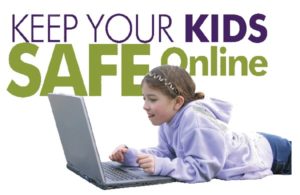3 Things Every Parent Needs to do to Protect Their Children in Cyber Space
Monitoring Kids’ Safety Online
 Online activity is second nature to today’s kids, but most of us with children didn’t grow up with the Internet. So it may be difficult to know how to advise them and monitor their safety online, especially when a lot of their school work and social life is centered on being connected. There is a lot that’s great about the Internet and the educational and recreational opportunities out there, but there’s also a lot that’s dark, evil, and dangerous. As parents, we need to help our kids make the right decisions and stay safe online.
Online activity is second nature to today’s kids, but most of us with children didn’t grow up with the Internet. So it may be difficult to know how to advise them and monitor their safety online, especially when a lot of their school work and social life is centered on being connected. There is a lot that’s great about the Internet and the educational and recreational opportunities out there, but there’s also a lot that’s dark, evil, and dangerous. As parents, we need to help our kids make the right decisions and stay safe online.
Allowing kids to have smartphones, electronic devices, computers, and connectivity to the Internet with no oversight, structure, or discipline is a disaster waiting to happen. As adults, we need to set the example, explain what is right or wrong, and take away their devices if they act dangerously, or cruelly, online.
In my forthcoming book, “Online Danger: Protecting Yourself and Your Loved Ones from the Evil Side of the Internet,” I devote an entire chapter to the ways that parents can proactively safeguard their kids’ online activities without being overly intrusive, or heaven forbid, embarrassing them. Here are some of my top suggestions.
Know What Apps They Use
Kids are not going to be as discriminating when it comes to downloading apps that they want – particularly games. But just because an app (for phone or PC) came from the Google or Apple store doesn’t make it safe. Many of today’s apps – by default – ask for access to the device’s camera, microphone, and location services. This means that your child’s phone might be spying on him or her because it has permission to do so. I suggest periodically reviewing the apps on your kids’ phones, and together determine whether they still use the app and how the permissions are set.
Follow Your Kids on Social Media
Children should have the expectation that you’ll follow them on social media platforms like Facebook, Instagram, and Pinterest. Make sure you all understand privacy settings, particularly who can see or share their posts and photos. You’ll periodically want to check who has connected with your kids, and don’t be shy about asking about faces you may not recognize. You’d much rather hear, “oh that’s Joe from my karate class” than “oh, that’s just someone who asked me to be their online friend.” Remember that predators can be anyone they want online.
As an added tip, it’s probably better not to interact with your kids or their friends on social media – the embarrassment factor is HUGE. Around the same time kids are ready for social media they are also mortified by just about anything.
Talk Openly About Online Risks
As we’ve learned more and more about human brain development we know that our kids are not just mini-adults with the ability to understand and reason like we do. They can’t be expected to always make smart decisions or foresee the consequences of their actions. That’s why, as parents, a big part of our job is to teach them these skills, encourage them to make the right decisions, and protect them – both from others and from themselves. Talking with your kids about online safety is an ongoing and age-appropriate process that starts the minute they start swiping on your phone or tablet, and continues into young adulthood.
One thing I believe strongly is that we should let our children know we will not tolerate inappropriate cyber behavior directed at other people. We talk a lot about how to prevent our children from becoming cyber victims. But we should also teach our children not to bully or victimize others online.
In addition to the chapter devoted to protecting our kids online, my book provides more great advice for parents, teachers, seniors and others who want to stay safe on the Internet.
